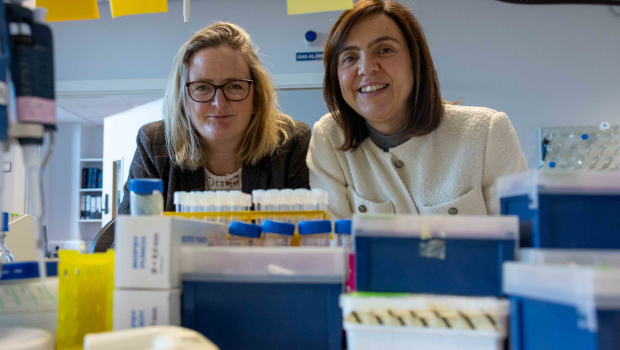
Wellcome Trust awards €5.3m to project tackling fatal bloodstream infections
A team of Irish and UK researchers, led by a University College Cork scientist at APC Microbiome have been granted a prestigious Wellcome Trust Discovery Award of €5.3 million to investigate the leading global cause of fatal bloodstream infection.
Bloodstream infections are a major cause of illness and death worldwide. The bacterium Staphylococcus aureus is the leading global cause of these fatal bloodstream infections, with antimicrobial resistant (AMR) strains such as methicillin resistant S. aureus (MRSA) compounding this major clinical problem.
Despite advances in modern medicine the incidences of S. aureus bloodstream infection is increasing year-on-year, and scientists and doctors have no definitive understanding of why this is. Furthermore, these bacteria are present in the microbiome of approximately one third of the human population, and it is well established that those colonised by S. aureus are at higher risk of infection.
Prof. Ruth Massey, based at the School of Microbiology in UCC and APC Microbiome Ireland, Prof. Rachel McLoughlin from the School of Biochemistry and Immunology at Trinity College Dublin, Prof. Mario Recker at the University of Exeter and researchers at the University of Bristol will use the funding to examine how this bacteria cause damage to human tissue and evade the immune system.
The cross-disciplinary team will now build the first detailed description of the key bacteria-host interactions and processes that control the establishment and severity of S. aureus bloodstream infection, with a view to identifying key intervention points to inform treatment guidelines and ultimately reduce the burden of S. aureus infection for patients and healthcare settings. The project will advance critical understanding of how this notorious human pathogen causes disease.
“We are locked in a battle in the dark against S. aureus bloodstream infections, where the bacteria currently have the upper hand, as we do not understand what is going on during the development of the infection” states Prof. Massey. “We believe that alongside other patient and bacterial factors, the role of the microbiome, with respect to both the presence of the bacteria with the microbiome, and how the microbiome trains our immune system to respond to infections will be key to tackling this major global clinical problem. This funding will allow us to shine a light on this poorly understood problem with a view to developing strategies and new therapies to reduce infection rates and patient suffering.”
Prof. McLoughlin, a professor in Immunology at the Trinity Biomedical Sciences Institute (TBSI), said: “The SNAP trial creates a once-in-a-lifetime opportunity to capture and define the full and varied picture of how this major human pathogen causes disease, and we are very grateful to Wellcome for enabling us to capitalise on this opportunity. This study has the potential to be a game changer for infectious disease research because it represents the first attempt to build a fully integrated model of an infectious disease incorporating the host, the pathogen and the treatment.
“This project will provide an entirely new understanding of how the notorious pathogen S. aureus causes disease. In doing so it will lead us to identify biomarkers for rapid patient risk stratification in clinical settings and identify new avenues for therapeutic development – ultimately, improving patient care and relieving the burden of this disease on a global level.”
TechCentral Reporters








Subscribers 0
Fans 0
Followers 0
Followers